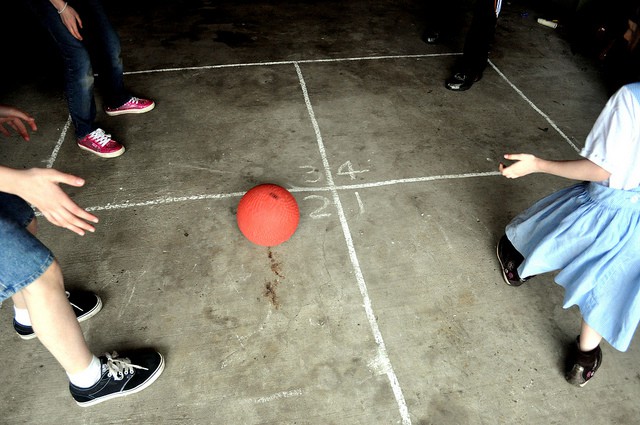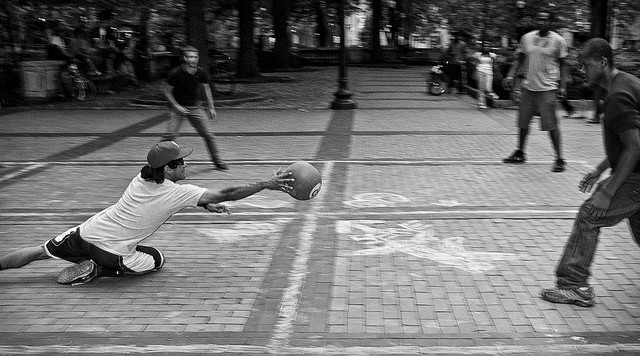Middle school sucks. Everything changes in middle school.
Few things were more awkward than the schoolyard in sixth grade. We’d all recently been moved up from various primary schools, so our social circles and playground norms were more fluid than before. This wasn’t necessarily a good thing. The borders had changed and we were still trying to figure out who the new kids were – a task made more complicated because at this school we were all new kids. There were some familiar faces and yet it felt as if something was different. We were the same people but, as my Chicano friends would say, a border seemed to have crossed us and it suddenly wasn’t clear in which foursquare court you belonged.
One day I saw a kid from my old school standing in line at one of those foursquare courts. Having heard a teacher call roll on the first day of class I had just learned that his name was actually Ricardo even though everyone in our last school called him Ricky. See what I mean? Things change. In any case, I walked over and stood next to him in line and waited to play.
One of the four boys already on the court – a fat kid wearing a Raiders jacket, a pair of Nike Cortez, and pressed-khakis – stood in the serving square. Confidently appointed in his proto-cholo wardrobe he seemed very aware that he was standing in a place with its own authority and power, a territory which bestowed it’s own kind of bravado on the person occupying it. As I arrived he was in the middle of calling out the rules. “No spinners, no slammers…” He paused. “Hey, Ricky,” he said, staring straight at me. “Who’s the whiteboy?”
I’d been in diverse schools my whole life but I think this was the first time I was ever made explicitly aware of my race. I’m Polish on my dad’s side and I’d heard plenty of Polish jokes growing up. I suppose I wondered about what made the Poles so stupid, but these were like any other jokes. Everyone was stupid in jokes. Being called a whiteboy on the playground was different; I suddenly felt nervous and a strangely personal shame began to rise in me. The fat kid repeated his question, making it clear that he doubted whether I should be in line on his court.
Ricky looked at me and then back at the boss and said, “It’s cool. He’s my homeboy.” I didn’t even know we were homeboys. I’m not even sure I knew what that meant. To be honest, I’m not entirely sure Ricky knew what that meant. But somehow, it seemed to change the tone of the fat kid in charge. “Alright,” he continued, “no spinners, no slammers, and no blackmagic. Let’s play.”
***
We have serious issues with race and privilege in this country. Every generation of migrants resists affording the next wave the same opportunities it had. And yet every generation seems willing to erect the same obstacles to inclusion that it was made to overcome. It’s a shame and we have lots of work to do if we’re serious about that whole liberty and justice for all business.
I’m a white male American Jesuit. I’ve checked just about every box there is to check on the privilege self-identification form. Whiteboy? I’m guilty as hell. But guilt is different than shame. Accepting privilege, like accepting guilt, is a liberating step. It’s just a step, but one in the direction of freedom and inclusion for all. I didn’t like being suddenly a whiteboy; I felt ashamed for something I didn’t understand. I know more now than I did then about how our differences were real and how that kid was right; I was a whiteboy. But I think Ricky was right too and I was grateful for his acceptance. I was relieved to be considered a homeboy as well.
Our differences are often simply a matter of the corrosive effects of cultural pressure and time. Things change and there is power in accepting that. It’s a different kind of power than the one we claim when we cling to privilege and prestige. Those things do real harm, but the sad truth is that they’re ultimately powerless. Acceptance and willingness to change is a real power, a natural power, a universal power; it’s the power of wisdom and love. Borders cross us every day. We may stand on top of the world now, but we’ll all be buried in it soon enough. Accepting this truth and appropriating it’s wisdom might help us to become more humble. And humility – knowing who you are and that you belong somewhere – is the mark of a true homie.
Unlike many of my friends, my fellow Catholics, and even members of my own family, I’m racially, culturally, sexually, economically, and socially privileged. And yet, I’ve been wounded too and I long for love and justice just like the rest of us. Our differences are real. But just as real is the pain of exclusion and the longing for acceptance that we all share. As Dorothy Day said, “We’ve all known the long loneliness and we have learned that the only solution is love and that love comes with community.”
The older I get, the more responsibility I can claim for how I choose to live my life. Just like on the four-square court, once I’m standing in my own serving square I can change some of the rules. I have some say in how the game is played: No spinners. No slammers. No blackmagic. Pero, sabes que? Todos los homeboys and homegirls are welcome. Recess is short. You can fight after school if you want to, but for now it’s my serve, so vamanos amigos…let’s play.
***
The SoCal public schools I attended as a child were diverse. Sometimes this diversity was hard to appreciate; it was a presumed backdrop, hidden in our history, both celebrated and suffered. Out east of LA there were many Mexican and Central American families who had migrated to find work in the vast citrus fields of Southern California, or even further back on the old Ranchos de Los Angeles (Palos Verdes, La Ballona, La Cienega, etc). Many of these families settled near the Pomona fairgrounds and the dairy farms of Chino just south of my childhood home.
Our suburban house backed onto one of those old citrus fields. My extended family members were mid-century mid-western transplants who were much more recently migrated to this land than many of my Latino friends. My own Polish ancestors were farmers in the old country, floor strippers in Detroit, and teachers in California. One thing I had in common with the kids at school was migration; we only differed in our culture of origin, our language, and our timing. But culture, language, and time make a big difference. And I certainly had privileges that they did not.
Things change in time. And no sooner.
Unless, I suppose, we accept the ways in which the game is fixed (or can be fixed); unless we accept liberating guilt and refuse oppressive shame; unless we decide to start playing by new rules; unless we get out of our old boxes and begin to consider ourselves homeboys and homegirls who would rather enjoy our time in freedom and love than waste it in cruelty and exclusion.
***
The cover image, from Flickr user Molly Sabourin, can be found here.



